 5 citations,
October 2014 in “Methods”
5 citations,
October 2014 in “Methods” The document explains how to create detailed biological pathways using genomic data and tools, with examples of hair and breast development.
5 citations,
March 2012 in “Veterinary dermatology” A cat developed a skin lesion from a topical solution, which healed with minoxidil treatment.
 5 citations,
February 2012 in “Aesthetic Plastic Surgery”
5 citations,
February 2012 in “Aesthetic Plastic Surgery” A man developed skin cancer on his scalp after multiple artificial hair grafts.
5 citations,
January 2012 in “Journal of nutrition & food sciences” The supplement improved hair, skin, and nails appearance and had long-term benefits.
 5 citations,
September 2011 in “Journal of the American Academy of Dermatology”
5 citations,
September 2011 in “Journal of the American Academy of Dermatology” A patient's skin eruption was caused by the cancer drug cyclophosphamide and improved after stopping the drug.
 5 citations,
May 2011 in “European Journal of Medical Genetics”
5 citations,
May 2011 in “European Journal of Medical Genetics” A genetic duplication on chromosome 5 was linked to a woman's unique combination of medical conditions.
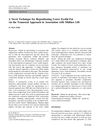 5 citations,
February 2011 in “Aesthetic Plastic Surgery”
5 citations,
February 2011 in “Aesthetic Plastic Surgery” The new technique for repositioning lower eyelid fat with a midface lift is easier, faster, and has better results with fewer complications.
5 citations,
January 1999 in “Pediatric Dermatology” A young girl had both alopecia areata and immune thrombocytopenic purpura at the same time, suggesting a possible link between the two.
 5 citations,
January 1970 in “Journal of Nepal Paediatric Society”
5 citations,
January 1970 in “Journal of Nepal Paediatric Society” Hair loss can be a key sign of a rare type of rickets when vitamin D treatment doesn't work and advanced tests aren't available.
4 citations,
March 2022 in “Journal of The American Academy of Dermatology” Finasteride use in young men with hair loss is linked to sexual dysfunction.
 4 citations,
August 2021 in “The Malaysian journal of medical sciences/The Malaysian Journal of Medical Science”
4 citations,
August 2021 in “The Malaysian journal of medical sciences/The Malaysian Journal of Medical Science” Eating fewer calories improves the ability of stem cells to repair and renew the body in various tissues.
 4 citations,
May 2021 in “Molecules”
4 citations,
May 2021 in “Molecules” The hair test for vitamin D could be a useful alternative to blood tests, providing a longer-term vitamin D status, but more research is needed.
 4 citations,
September 2020 in “Journal of Cosmetic Dermatology”
4 citations,
September 2020 in “Journal of Cosmetic Dermatology” PRP treatment significantly increased hair density and thickness in male hair loss.
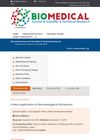 4 citations,
November 2019 in “Biomedical Journal of Scientific and Technical Research”
4 citations,
November 2019 in “Biomedical Journal of Scientific and Technical Research” The document concludes that the acoustic coupler SF-001 is good for skin ultrasound, especially on rough body parts, because it's stable and shows blood vessels well.
 4 citations,
October 2019 in “Case Reports”
4 citations,
October 2019 in “Case Reports” A 33-year-old woman with PCOS and metabolic syndrome was unusually diagnosed with a bone condition called DISH, suggesting a possible link between these conditions.
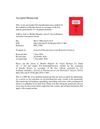 4 citations,
November 2018 in “Journal of Pharmaceutical and Biomedical Analysis”
4 citations,
November 2018 in “Journal of Pharmaceutical and Biomedical Analysis” Roselle flower extracts can protect against free radical damage in UV-irradiated antibiotics.
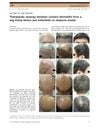 4 citations,
September 2018 in “The Journal of Dermatology”
4 citations,
September 2018 in “The Journal of Dermatology” A man's hair regrew from alopecia areata after using tofacitinib and experiencing contact dermatitis from a wig device.
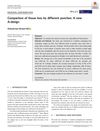 4 citations,
June 2018 in “Journal of Cosmetic Dermatology”
4 citations,
June 2018 in “Journal of Cosmetic Dermatology” The new A-design punch for hair restoration surgery may lead to smaller scars compared to other types.
 4 citations,
January 2017 in “Ciência Rural”
4 citations,
January 2017 in “Ciência Rural” A horse in Brazil with skin and gut issues was diagnosed with a severe disease and had to be euthanized.
 4 citations,
September 2015 in “Bulletin of the Korean Chemical Society”
4 citations,
September 2015 in “Bulletin of the Korean Chemical Society” Researchers developed a quick and sensitive method to identify and measure hair growth-promoting substances in a herbal mix.
 4 citations,
July 2015 in “Case Reports in Dermatology”
4 citations,
July 2015 in “Case Reports in Dermatology” A woman with unexplained hair loss was found to have harmless skin tumors and a scarring hair loss condition, but the tumors didn't cause the hair loss.
 4 citations,
March 2015 in “Skin Research and Technology”
4 citations,
March 2015 in “Skin Research and Technology” Trichotillometry is a reliable method to measure hair strength and assess hair loss treatments.
 4 citations,
December 2012 in “Human Biology”
4 citations,
December 2012 in “Human Biology” The most different genetic segment between Africans and East Asians is the EDA2R/AR region, with two main types influenced by population changes and natural selection, and linked to baldness.
4 citations,
January 2011 in “European journal of dermatology/EJD. European journal of dermatology” A boy had a rare scalp condition with thickened skin and different-colored hair.
 4 citations,
January 2011 in “Medical Hypotheses”
4 citations,
January 2011 in “Medical Hypotheses”  4 citations,
January 2007 in “Australian Veterinary Journal”
4 citations,
January 2007 in “Australian Veterinary Journal” A horse's sudden hair loss was caused by an allergic reaction to a coat conditioning powder.
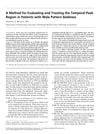 4 citations,
May 2002 in “Dermatologic Surgery”
4 citations,
May 2002 in “Dermatologic Surgery” The method improves natural appearance in hair restoration by properly evaluating and treating the temporal peak region.
4 citations,
October 2001 in “Mycoses” A young cat had a rare fungal infection caused by Microsporum gypseum.
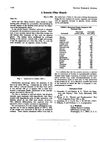 4 citations,
November 1968 in “Textile research journal”
4 citations,
November 1968 in “Textile research journal” Hair fibers may have a unique, non-protein sheath not previously identified.
 3 citations,
September 2023 in “Advanced science”
3 citations,
September 2023 in “Advanced science” A new vaccine using a porous scaffold boosts immunity and protects against the flu better than traditional methods.
























